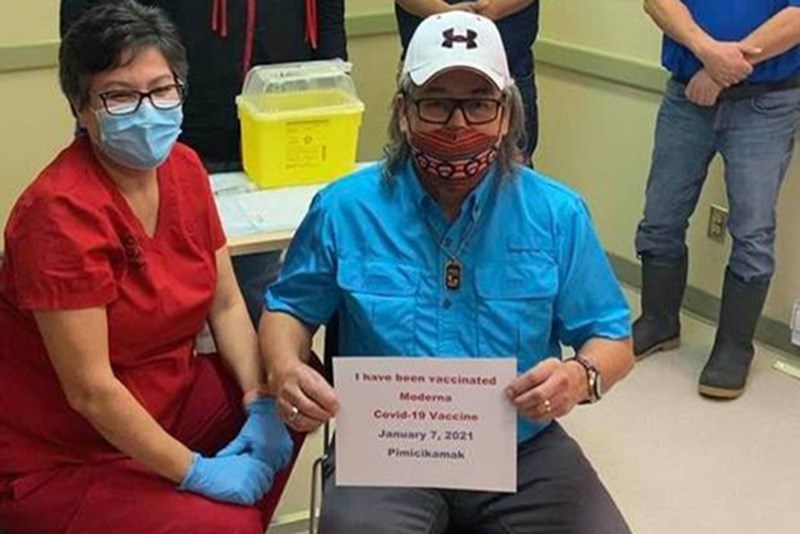Leaders of some of the seven Northern Manitoba First Nations that have received their first shipments of COVID-19 vaccines say it is a turning point in the battle against the virus, even if a small percentage of people aren’t eager to be immunized.
One of those leaders put himself forward as an example for others and received the first vaccination in Pimicikamak Cree Nation (PCN) and in any Manitoba First Nation.
PCN Coun. Mervin Garrick was with Chief David Monias and another councillor to meet the plane when it arrived with the first shipment of 199 doses of the Moderna vaccine on Jan. 7. As an elder 70 or older, he was eligible to receive the vaccine and did so that night, with local nurse Brenda Frogge administering the shot.
“Elders have called me, talked to me about the vaccine and I just told them it’s better to take it,” said Garrick during a Jan. 12 Zoom press conference organized by Manitoba Keewatinowi Okimakanak (MKO).
Monias said the example shown by Garrick and other elders who have already received their vaccinations is a good start to the immunization campaign.
“They stepped up to be the first to show that this is a good thing, that it’s safe and that our people should be vaccinated,” Monias said.
York Factory First Nation (YFFN) Chief Leroy Constant said the first vaccination in the community was delivered on Monday afternoon and that nine more people received their first dose that day. Ten more were scheduled to receive it on Tuesday. The community of less than 400 people received only 20 doses of the vaccine in their first shipment to vaccinate members aged 70 and older.
“Once I qualify I will get the vaccine,” said Constant, who says his next vaccination challenge as chief will be getting people to take the trip to Thompson to get the Pfizer vaccine once the Thompson vaccination site is up and running, which is scheduled to be by Feb. 1.
In Norway House Cree Nation, about 90 people have received the vaccine so far, said Chief Larson Anderson, including 19 personal care home residents, 30 to 35 care home staff and elders aged 70 and up.
Overall, there haven’t been many people who have declined to get vaccinated, though mistrust about the vaccine and misinformation about COVID-19 are apparent.
Anderson said three people initially refused to get vaccinated in Norway House but then changed their minds after talking to a doctor. Monias said there were two people who declined the shot in Cross Lake, reasoning that they had never gotten immunized before and didn’t see the point in starting now, a sentiment that is also present in YFFN.
“We have a lot of old school people in out community that don’t believe in the western way [of medicine],” said Constant. “We have to respect that.”
Monias says it’s up to individuals if they want to get the vaccine or not and his role is to ensure that they make an informed decision.
“It’s not my job to force people to take it,” he said.
Some people are almost thrown into a state of panic by hearing that the virus is in the region, however.
“People think that if you catch it you’re going to die,” Constant said, despite the truth that the vast majority of people who contract COVID-19 recover, most of them without any medical intervention.
Dr. Michael Routeledge, a medical advisor to MKO and its new health entity Keewatinohk Inniniw Minoayawin, said COVID-19 has had a disproportionate effect on First Nations in general and MKO First Nations in particular, with First Nations citizens who contract COVID-19 making up more hospitalizations and intensive care admissions than their proportion of the overall population and dying at younger ages than Manitobans as a whole who succumb to the virus.
“That’s not surprising,” said Routledge. “We expected to see that.”
MKO Grand Chief Garrison Settee said getting vaccinated is an important part of keeping First Nations members healthy.
“Since the pandemic began we always knew we were the most vulnerable,” Settee said.
The leaders agree that better health care in their communities and better housing are the key to making First Nations better able to weather challenges like this pandemic in the future.
”The north has a lot of different challenges from the south,” said Constant. “Your fate is determined by a doctor over the phone a lot of times. It’s not a good system.”
Monias said First Nations need to be in charge of their own health care systems and facilities.
“It has to be a paradigm shift on how health care is administered in the north,” said Settee. “The system has been broken and it needs to be changed.”




